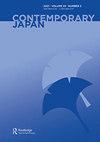The 2020/2021 Tokyo Olympics: Does Japan get the gold medal or the wooden spoon?
引用次数: 0
Abstract
ABSTRACT The Tokyo 2020/2021 Olympics will go down in history as the 'Pandemic Games'. Postponed by a year due to Covid-19, they were eventually held despite broad public protest and amidst the Delta variant wave. Japan brought home a record haul of medals, yet Prime Minister Suga Yoshihide resigned in ignominy shortly after the Games ended. So, was Tokyo 2020/2021 a 'success' or a 'failure', and for whom? We examine the policy and politics of the Games, considering the attribution of 'success' and 'failure' to the Olympics across a range of issues, actors, and narratives. Reviewing their economic, public health, soft power, and political impact, we find that the Tokyo 2020/2021 Olympics remain deeply ambiguous. Prime Minister Abe Shinzō’s vision of a proud, 'reborn' Japan showcasing itself to the world obviously did not come to pass; neither did the promise of a 'Recovery Olympics' aiding in the reconstruction of the post-3/11 Tohoku region. Conversely, the predictions of a COVID-19 catastrophe, of even an 'Olympic variant', also failed to transpire. Rather, the Olympics became a pared-down event forced through by vested interests, notably the IOC and Dentsu. The political fallout was contained by one-party dominance in Japan’s democracy, where even a forced mega-event during a pandemic was insufficient to threaten the Liberal Democratic Party’s stranglehold on power.2020/2021年东京奥运会:日本获得金牌还是木勺?
摘要2020/2021年东京奥运会将作为“流行病运动会”载入史册。由于新冠肺炎推迟了一年,尽管公众广泛抗议,在德尔塔变异浪潮中,他们最终还是举行了。日本带回了创纪录的奖牌,但首相菅义伟在奥运会结束后不久就可耻地辞职了。那么,2020/2021年东京奥运会是“成功”还是“失败”,对谁来说?我们研究了奥运会的政策和政治,考虑了一系列问题、参与者和叙事对奥运会“成功”和“失败”的归因。回顾其经济、公共卫生、软实力和政治影响,我们发现2020/2021年东京奥运会仍然模糊不清。日本首相安倍晋三(Abe Shinzō)关于一个自豪、“重生”的日本向世界展示自己的愿景显然没有实现;“复兴奥运会”的承诺也没有帮助重建3/11后的东北地区。相反,新冠肺炎灾难的预测,甚至“奥运变种”的预测也未能实现。相反,奥运会变成了既得利益者(尤其是国际奥委会和电通)强迫举办的精简赛事。一党在日本民主中的主导地位遏制了政治影响,即使在疫情期间举行一场强制性的大型活动,也不足以威胁自民党对权力的控制。
本文章由计算机程序翻译,如有差异,请以英文原文为准。
求助全文
约1分钟内获得全文
求助全文

 求助内容:
求助内容: 应助结果提醒方式:
应助结果提醒方式:


